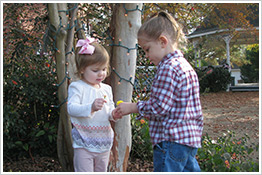Happiness and Peace
How can we help our children be happy? Use the Beatitudes: “Blessed are the peacemakers!”
By Marjorie Eddington
Categories: Beatitudes, Family, Love As parents, we want our children to be happy. There are many resources that give good guidance as to how to help our children (and ourselves) experience happiness. But the best and most timeless resource of all is the Bible, especially The Sermon on the Mount. Jesus’ beatitudes provide keys to complete happiness.
 The beatitudes are really attitudes of being happy. Blessed means “enjoying happiness; enjoying the bliss of heaven; bringing pleasure, contentment” (Webster). There are really two aspects here: understanding our relationship with God, which brings bliss or true happiness; then, actively sharing that blessing with others. The beatitudes are really attitudes of being happy. Blessed means “enjoying happiness; enjoying the bliss of heaven; bringing pleasure, contentment” (Webster). There are really two aspects here: understanding our relationship with God, which brings bliss or true happiness; then, actively sharing that blessing with others.
Being parents elicits all of the emotions one can possibly imagine. So it’s incredibly helpful as we wind our way through the ups and downs, through the knowns and mostly unknowns, that we are “poor in spirit” (Matt 5:3). What does that mean?
- “God makes happy those who know that they need him” (WE).
- “God blesses those people who depend only on him." (CEV)
- “You’re blessed when you’re at the end of your rope. With less of you there is more of God and his rule.” (The Message)
What would happen if there were less of our own wills, plans, or personalities? We would find that God is right there, parenting our children. We would hear God’s voice telling us what to do. Our own opinions wouldn’t get in the way. So as we rely totally—that means for everything and in every situation—on God to help us parent our children, we will discover and experience the blessings of “the kingdom of heaven.”
Now sometimes, family homes can feel like anything but the kingdom of heaven—the kingdom of harmony and happiness. Sometimes arguing, power struggles, defiance, rebellion, personality conflicts, deception, etc, disrupt the peace. How do the beatitudes help us here?
Jesus tells us to actively pursue peace: “Blessed are the peacemakers, for they will be called children of God” (Matt 5:9). We can help our children, no matter their age, be peace makers.
This beatitude has become a staple in our home, and it makes a world of difference. It came to me one day in the car when my young children started arguing in the back seat. All of a sudden, I blurted out, “Who wants to be a peacemaker?” It was incredible. The arguing ceased, and they both rushed to cry out, “I do!” They each quickly apologized and affirmed their love for each other. That was the end of the arguing.
There are other times, though, when I ask the same question, and one will be more willing than the other; but the other always comes around. Or, when in the silence that follows the question, we talk about how to make peace. Sometimes they can figure out a solution on their own. Other times, they get stuck in the story of what just happened, which never leads to resolution. So they need help.
It’s helpful to remember that when they get stuck in the story, they’re usually scared or hurt. Talking about “what happened” or impulsively reacting with anger keeps them from having to deal with their feelings. And they don’t want to deal with their feelings because, well, they’re yucky. They didn’t get angry and hurt their sibling because they felt happy.
Children really don’t like arguing. In fact, they can’t stand it. It’s just at that time and in that space, they simply don’t know how else to solve the problem because they are still developing or learning the tools they need in order to find peaceful solutions. (Even us parents are still learning.) That’s where we come in—with a peaceful, calm assurance that there is a solution and that we have confidence in their ability to figure it out together.
We model being peacemakers—with our spouses, friends, children, our own parents, everyone. We express empathy and allow them to feel and help them identify their feelings, which may be quite deep—without judgment from us. This actually makes emotions less scary and helps them have more self-regulation. All of this helps them become better peacemakers.
We can do all of this because we are leaning totally on God for guidance and direction. We can help our children because we are also experiencing peace, the presence of all good, and we are trusting in that goodness. It’s hard to do this when our feelings are frazzled, when we leave God out of the picture, think we have to do it all by ourselves, or are triggered by what they just did. So if we’re in a situation where we find we’re not peaceful, it’s okay to take a little bit of time to breathe, lean on God, and get a sense of peace before we turn to help our children do the same. It’s well worth it.
The blessing for being apeacemakers is an affirmation of our identities: “children of God.” We can support our children in finding the happiness that comes from being God’s child. Such happiness can never be taken from us. It’s God’s blessing to us and to them.
Happy parenting! |